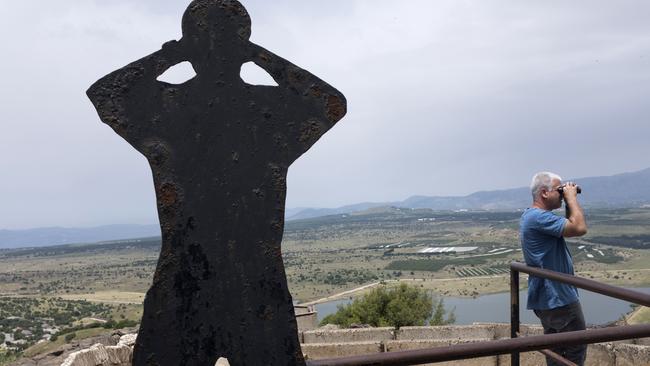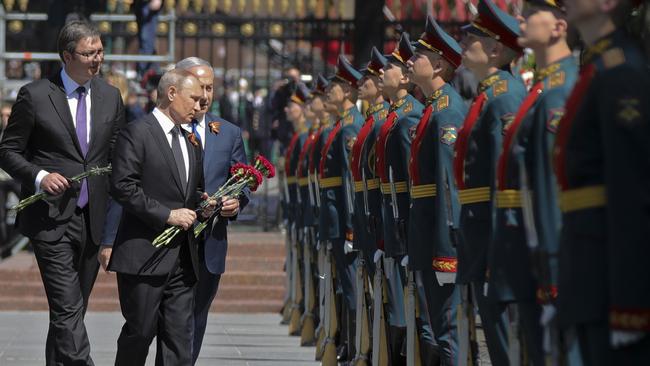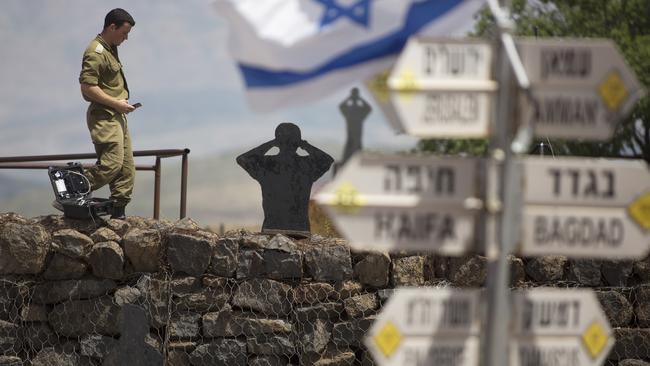Why Russia is Israel’s Middle East peace plan
VLADIMIR Putin and Benjamin Netanyahu may seem strange bedfellows, but there’s a very good reason Israel is cosying up to Russia, writes Dennis Atkins.

Rendezview
Don't miss out on the headlines from Rendezview. Followed categories will be added to My News.
ON Wednesday of this past week a pair of seemingly strange bedfellows stood side-by-side in Moscow’s Red Square watching a parade of Russian military might.
President Vladimir Putin had his guest of honour next to him, Israeli Prime Minister Benjamin Netanyahu, who was wearing the shunned back and orange St George’s ribbon a bold symbol of past and present Russian military glory.
This ribbon has also been adopted as a totemic sign that Russia should return to the grand days of Soviet hegemony — including the reincorporation of those territories that were given independence when the Union collapsed in 1989.
Netanyahu’s attendance is not a new move to stay close to the Russians — the most senior political, strategic and military figures in Jerusalem regard Moscow as the best hope for some order in that chaotic failed state to Israel’s north, Syria.
With President Donald Trump this week announcing he would not renew US observance of the Iran nuclear and sanctions deal, Israel sees Russia as a vital player in heading off an all out shooting war with the mullahs in Tehran.
Eran Lerman, a former foreign policy deputy director on Israel’s National Security Council, says Jerusalem and Moscow have a no-nonsense, hard-headed relationship based on cautious trust.

“The Russians are worrying that we may go after (Syrian President Bashar al) Assad, and we are telling them we are not going to go after Assad unless he allows the Iranians to go after us,” Lerman told The Wall Street Journal this week.
This is a game of geo-strategic chess that has been going for decades but is now reaching what could be a new crisis point.
The Iranians are desperate to preserve the Joint Comprehensive Plan of Action, to give the agreement to curb Tehran’s military nuclear ambitions in exchange for lifting of crippling sanctions.
Trump has effectively scrapped the deal, finalised in 2015 by the five permanent members of the United Nations Security Council (the US, the UK, France, Russia and China) plus Germany although he did leave the door open the tiniest bit at the end of his televised announcement.
“Iran’s leaders will naturally say they refuse to negotiate a new deal,” said Trump.
“But the fact is they are going to want to make a new and lasting deal, one that benefits all of Iran and the Iranian people.
“When they do, I am ready, willing and able. Great things can happen for Iran and great things can happen for the peace and stability that we all want in the Middle East.”
Trump’s coda to his statement relinquishing the deal at least for now was necessary to prevent the other signatories from unleashing rage against Washington.
It was also aimed at giving Iranian President Hassan Rouhani the ability to convince Iran’s Supreme Leader Ali Khamenei not to respond by waging all out war against Israel, which the religious leadership in Tehran says should be “driven into the sea”.

Iran’s ultimate ambitions to be a hegemonic power in the Middle East and Southern Asian regions rest on having what’s known as the Green Crescent or the Shia Crescent which sweeps from Bahrain in the Persian Gulf up through Iran and across Iraq and into Syria before reaching the Mediterranean reaching down to Lebanon.
The dream of the Iranian mullahs is for this to be dominated by Iran in both religious and military ways.
Iran has Iraq as a client state and now has a formidable presence in Syria where Assad has invited the revolutionary regime to set up military bases which act as a jumping off point for not just attacks on the opponents of Damascus but also Israel.
In February this year Iran “crossed a red line” according to senior Israeli sources when an armed drone penetrated Israel’s airspace on a mission which was claimed to be aimed at attacking targets on the Golan Heights.
Israel responded with a range of attacks on Syrian and Iranian military targets and Iran replied with a threat to punish Jerusalem.
After Trump announced he’d ditch the nuclear deal, Iran hit back this week with a volley of missiles aimed directly at Israeli troops on the Golan Heights — weapons that were intercepted by Israel’s protective Iron Dome.
Israel responded with its biggest military action and provocation in Syria for decades, with an intense four hour jet assault, hitting 70 Iranian targets across Syria.
The situation remains tense and Israel now believes Russia holds the key to what happens next, which is why Netanyahu was standing next to Putin this week.
If Russia can convince Assad to keep Iran in some kind of check there’s a chance things won’t escalate.
Otherwise we could see the next big Middle East war and it won’t be one for the faint hearted.
Dennis Atkins is The Courier-Mail’s national affairs editor.
Don’t miss Dennis Atkins and Malcolm Farr’s politics podcast Two Grumpy Hacks available for free on iTunes or Soundcloud or wherever you get your favourite listening.


